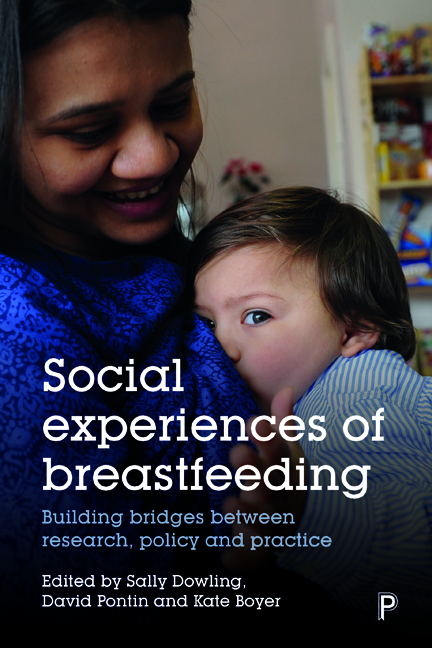Book contents
- Frontmatter
- Dedication
- Contents
- List of tables and figures
- Notes on contributors
- Acknowledgements
- Introduction
- The UK policy context: reconfiguration of the Unicef UK Baby Friendly Initiative to reflect the importance of relationships and ensuring sustainability
- Part I Breastfeeding and emotions
- Part II Cultures of breastfeeding
- Part III Breastfeeding and popular culture
- Conclusion
- Appendix: Schedule for ESRC Seminar Series: Social Experiences of Breastfeeding: Building bridges between research and policy, 2015–16
- Index
six - Changing cultures of night-time breastfeeding and sleep in the US
Published online by Cambridge University Press: 22 April 2022
- Frontmatter
- Dedication
- Contents
- List of tables and figures
- Notes on contributors
- Acknowledgements
- Introduction
- The UK policy context: reconfiguration of the Unicef UK Baby Friendly Initiative to reflect the importance of relationships and ensuring sustainability
- Part I Breastfeeding and emotions
- Part II Cultures of breastfeeding
- Part III Breastfeeding and popular culture
- Conclusion
- Appendix: Schedule for ESRC Seminar Series: Social Experiences of Breastfeeding: Building bridges between research and policy, 2015–16
- Index
Summary
Introduction
Expectant parents in the US usually receive advice on all aspects of pregnancy, childbirth and infant care from multiple medical experts. This guidance reflects cultural assumptions that childbearing requires specialised medical knowledge, which divides the care of mothers and infants under the supervision of separate medical experts, and further fragments various aspects of infant care, including feeding and sleep. This chapter uses historical and ethnographic research to explore the origins of these assumptions and their consequences for American parents who embark on breastfeeding. I suggest that severing the links between these evolutionarily and physiologically connected domains (McKenna et al, 2007; McKenna and Gettler, 2016) has had a significant detrimental impact on night-time infant care. Parents have been left without adequate community cultural knowledge about the interaction of breastfeeding and sleep, and assume that these processes are separate. As a result, they are frequently surprised by infants’ night-time behaviour and have difficulties navigating night-time breastfeeding and sleep. These challenges constitute an important element of an already formidable set of barriers to breastfeeding in the United States, where structural support is extremely limited and breastfeeding remains a controversial practice (Tomori et al, 2016). The anthropological lessons from this chapter can be used to make breastfeeding more feasible and sustainable for all families, by developing integrative models that support the dynamic interactions between mothers and infants throughout the day and night.
The origins of fragmentation
The medicalisation of childbirth and the decline of breastfeeding
In colonial America, midwives attended women and their families throughout the entire circle of life from birth to death. Midwives supported the full spectrum of childbearing by assisting during labour and birthing, helping mothers learn to breastfeed, care for their infants and deal with breastfeeding difficulties. All of these events took place in the family home, with the midwife travelling to her charges as she was needed in the community. The rhythm of this life is apparent in Ulrich's (1990) masterful study of Martha Ballard, a midwife living in Maine during the 1700s and early 1800s, who left behind a detailed diary of her daily activities. Ballard travelled throughout the day or night, sometimes in trying weather conditions, on foot, horseback and even by canoe, to attend women in childbirth and to carry out her other duties.
- Type
- Chapter
- Information
- Social Experiences of BreastfeedingBuilding Bridges between Research, Policy and Practice, pp. 115 - 130Publisher: Bristol University PressPrint publication year: 2018
- 1
- Cited by



